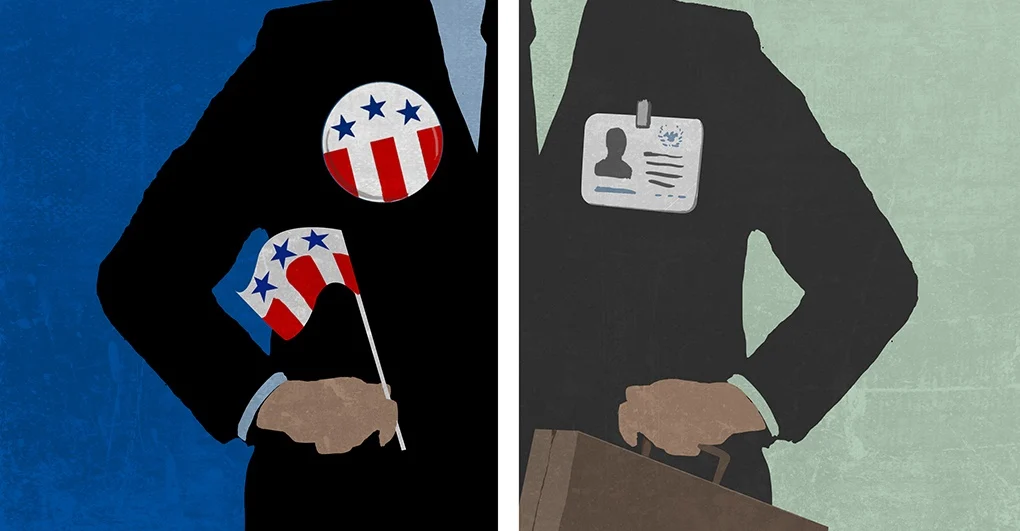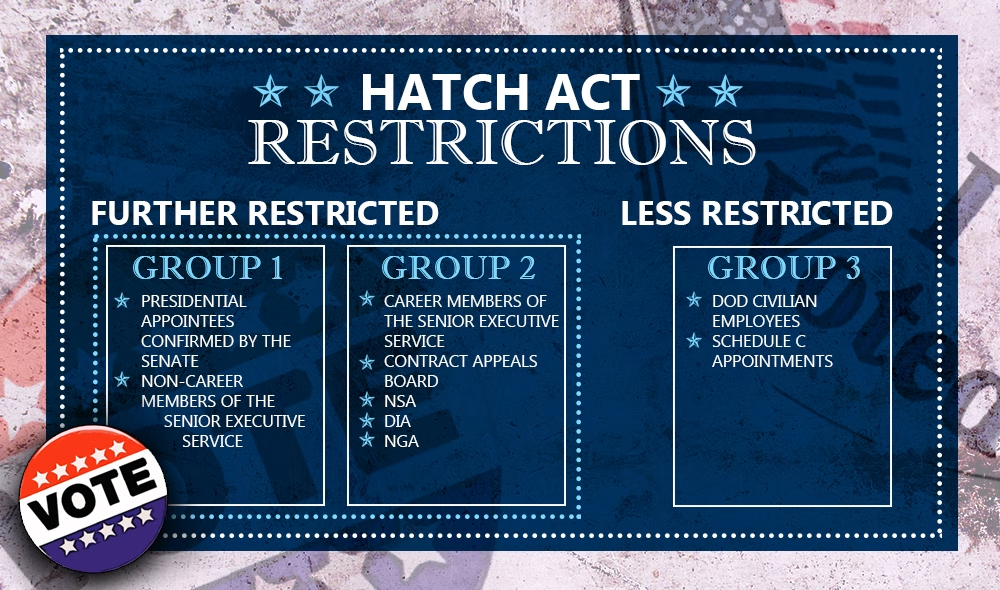Presidential Appointees and the Hatch Act
The Secretary of the Navy supports the man who hired him. Who knew?

AP‘s Lolita Baldor (“Navy secretary breaks law with political statements about presidential race, watchdog says“):
Navy Secretary Carlos Del Toro broke the law by publicly endorsing the reelection of President Joe Biden and criticizing former President Donald Trump in several statements he made while on official duty overseas, the U.S. Office of Special Counsel said Thursday.
In a report to the White House, the watchdog agency said Del Toro’s comments about the presidential election came in a BBC interview and when he was responding to questions after a speech in London. While he later reported the remarks, his unwillingness to take responsibility for them is troubling, the special counsel said.
The agency said Del Toro’s comments, which were made before Biden dropped out of the presidential race, violate the Hatch Act, which prohibits U.S. officials from engaging in political activity while they are on duty and from “using their official authority or influence to interfere with or affect the result of an election.”
“The United States and the world need the mature leadership of President Biden,” Del Toro said in response to a question after giving a speech at the Royal United Services Institute in late January. He added, “We cannot afford to have a president who aligns himself with autocratic dictators and rulers whose interpretation of democratic principles is suspicious (at) best.”
Later, during an interview on “BBC News Sunday,” Del Toro was asked about his comments on Trump’s democratic principles. Del Toro responded that in the past, Republican and Democratic presidents abided by core American values and protected democracy.
“When you have someone who doesn’t align to those core principles, it makes you wonder, you know, should you be supporting that individual?” he said.
Del Toro was asked, “You said he had a suspicious attitude to democracy?” And the Navy secretary responded, “Absolutely so.”
Several days later, Del Toro self-reported the blunder to the special counsel, saying his intention was to focus on the importance of strong international alliances. But, he added, “In retrospect, I believe my response should have been delivered more broadly without reference to specific candidates.”
In a separate written response to the watchdog’s findings, the secretary’s lawyer, Michael Bromwich, said Del Toro’s remarks were “spontaneous and unpremeditated” and did not constitute a violation of the Hatch Act. Bromwich said Del Toro was responding to questions and did not directly speak Trump’s name.
Special counsel Hampton Dellinger said in his report that Del Toro “crossed a legal line.” And he said the secretary’s “unwillingness to acknowledge a mistake is striking” and troubling.
Asked about the violation, Pentagon spokeswoman Sabrina Singh said at a briefing that the department is reviewing the report. She added that “it’s important that we maintain the trust and confidence of the American people, which requires us to avoid any action that could imply the support of any political party, candidate or campaign.”
[…]
Dellinger said he appreciates that Del Toro reported the comments, “but this fact alone should not absolve him.” Del Toro has also issued his own directive for his Navy force, Dellinger said, noting that “it is more important than ever for us to remember that the DON (Department of the Navy) is an apolitical body. …. Public trust and confidence depend on this.”
The findings come after two Democratic members of Congress sent a letter to the Pentagon’s top two leaders in August, pressing them to ensure the military is not swept up in politics during the presidential election.
In full disclosure, both my wife and I are civilian employees of the Department of the Navy, and thus, Del Toro is our boss (albeit considerably up the chain of command). We are both subject to the Hatch Act, although it’s a bit more complicated in my case because I’m an Excepted Service college professor with academic freedom, creating a bit more of a gray area.
It is imperative that policymakers and the American people see the civil service and, especially, the uniformed military* as nonpartisan. If anything, the rules on partisan activity are looser than they should be because they were written when the distinction between “on duty” and “off duty” was much brighter. Social media posts before or after duty hours are equally visible. That we allow military officers, in particular, to display partisan bumper stickers on their vehicles baffles me.
At the same time, Presidential appointees, especially senior ones like cabinet and sub-cabinet officials, are specifically there to enact the policy preferences of the person who appointed them. You would have to be a blithering idiot to wonder which candidate Del Toro supported in the 2024 election—especially when Biden was still a candidate.
While we obviously don’t want the Secretary of the Navy spending considerable time campaigning for Biden’s re-election—much less touting the benefits of electing Democrats to his subordinates—answering a question from a reporter in the way he did doesn’t strike me as problematic. But, under the law, he’s actually more restricted than my wife and I are by virtue of being in a presidentially-appointed, Senate-confirmed (PAS) position.

Group 2 makes sense, in that they are in sensitive positions related to law enforcement, intelligence, or election monitoring: Federal Election Commission; Election Assistance Commission; Federal Bureau of Investigation; Secret Service; Central Intelligence Agency; National Security Council; National Security Agency; Defense Intelligence Agency; Merit Systems Protection Board; Office of Special Counsel; Office of Criminal Investigation of the Internal Revenue Service; Office of Investigative Programs of the United States Customs Service; Office of Law Enforcement of the Bureau of Alcohol, Tobacco, and Firearms; National Geospatial-Intelligence Agency; Office of the Director of National Intelligence; Criminal Division of the Department of Justice; National Security Division of the Department of Justice; as well as Persons employed in positions described under Sections 3132(a)(4), 5372, 5372 (a), or 5372(b) of Title 5, United States Code, including: Senior Executive Service [career positions described at 5 U.S.C. § 3132 (a)(4)]; Administrative Law Judges [positions described at 5 U.S.C. § 5372]; Contract Appeals Board Members [positions described at 5 U.S.C. § 5372 (a)]; and Administrative Appeals Judges [positions described at 5 U.S.C. § 5372(b)].
However, PAS employees are policymakers who almost always come from the ranks of party operatives. And, it turns out, the law recognizes this:
An employee appointed by the President, by and with the advice and consent of the Senate (PAS), is subject to the provisions of the Hatch Act. However, certain PAS’s are not subject to the Act’s prohibition against engaging in political activity while on duty, in a federal room or building, wearing an official uniform or insignia, or using a government vehicle. To be exempt from this prohibition, a PAS must meet all of the following criteria:
1) the duties and responsibilities of his position must continue outside normal duty hours and while away from the normal duty post;
2) his position must be located within the United States; and
3) he must determine policies to be pursued by the United States in relations with foreign powers or in the nationwide administration of federal laws.
If a PAS meets all these criteria, he is not prohibited from engaging in political activity while on duty, in a federal room or building, wearing an official uniform or insignia, or using a government vehicle, provided the costs associated with the political activity are not paid for by money derived from the Treasury of the United States. However, the PAS remains subject to all the other prohibitions of the Hatch Act, and thus, may not: use his official authority or influence for the purpose of interfering with or affecting the result of an election; knowingly solicit, accept, or receive a political contribution from any person; be a candidate for public office in a partisan election; or knowingly solicit or discourage the political activity of any person who has business before the employee’s employing office.
The Secretary of the Navy meets these criteria, so he’s allowed to “engage in political activity” in the course of his work. Which, again, makes sense given that his job is inherently political in the sense of setting policy. He’s still not allowed to act with “the purpose of interfering with or affecting the result of an election.” It’s not at all clear to me that he was doing that in answering the question in the way he did.
Indeed, I can’t imagine the undecided American voter who would have seen or read the interview and thought, “Well, if Secretary of the Navy Carlos Del Toro thinks Biden is better than Trump, that settles it for me!” While I’m a decidedly decided voter, there has not been a single election in which the endorsement of a presidential appointee would have had the slightest impact on my decision.
*To be clear: The uniformed military isn’t subject to the Hatch Act but rather to very similar strictures under the UCMJ and various Department and Service policy orders. The most prominent of these, DoD Directive 1344.10, “Political Activities by Members of the Armed
Forces on Active Duty,” was last updated in 2008.
Well, until Kellyanne Conway is held accountable for her Hatch Act violations, none of this matters a tinker’s damn, and OSC is a toothless tiger by its own design. And SecNav knows it.
@DeD: That’s a fair point but, frankly, what I said about Del Toro is doubly true of Conway: her job in the administration was even more inherently political, as she was in Trump’s White House inner circle as a domestic policy advisor. SECNAV is at least a more technocratic post.
EDITED TO ADD: See my contemporaneous post “Kellyanne Conway Violated Hatch Act” for a more detailed take on that front.
@James Joyner:
I was making the broader point of how Trump transformed the way we view our governance systems and how laws, policies, rules, regulations, practices, etc., have been reprioritized so that what mattered in the anteTrumpidian age is now given only lipservice. I guess I should have just said that.
@DeD: This exactly. We’re supposed to care about norms and symbolic laws NOW? F that.
@Flat Earth Luddite:
Obviously Luddite’s can’t finger out which thread to respond to. Mea culpa
So, hypothetically speaking, what happens when the civil servants in the intelligence community conclude, as part of their official duties, that a major party nominee for President represents a significant national security threat, and/or is working with adversaries and anti-American organizations to spread disinformation and undermine American institutions? They can say this publicly, but can’t add “…so don’t vote for him”?